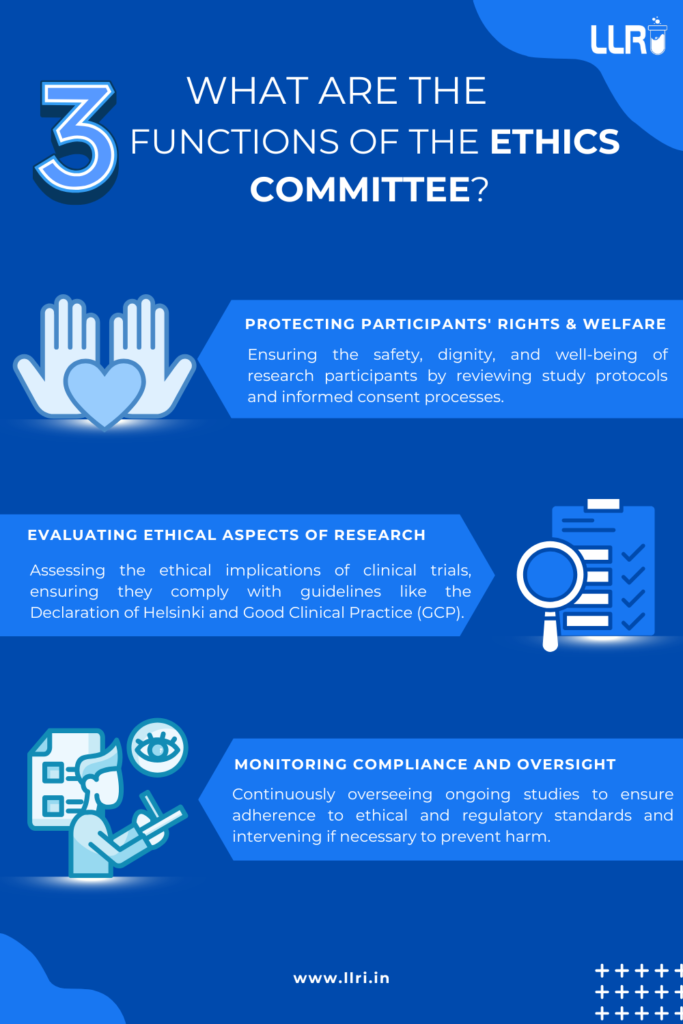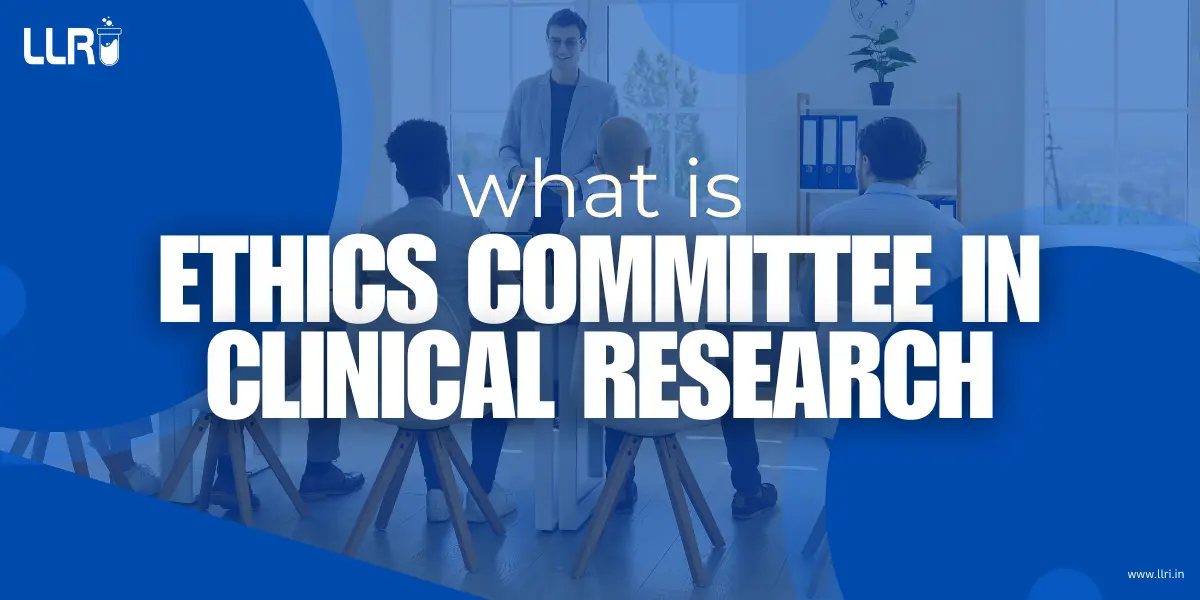Ethics Committee In Clinical Research: The safety and rights of participants in clinical trial/clinical research is paramount -and to maintain this, we have the ethics committee in clinical research. It acts as a guardian of ethical standards, ensuring that clinical trials are conducted with transparency, fairness, and respect for human dignity.
But what exactly is an ethics committee? How is it structured? What are the different types? If you’re looking for answers, you’re in the right place!
What Is Ethics Committee in Clinical Research?
An ethics committee in clinical research is an independent body that reviews and monitors biomedical research involving human participants. Its primary goal is to ensure that research adheres to ethical principles, including:
- Protecting the rights, safety, and well-being of participants
- Maintaining scientific integrity in research
- Preventing exploitation and unethical practices
- Ensuring informed consent from participants
The committee follows guidelines set by regulatory bodies such as the Indian Council of Medical Research (ICMR), Drugs Controller General of India (DCGI), and international organizations like WHO & ICH-GCP (Good Clinical Practice).

Role of Ethics Committee in Clinical Research
The role of ethics committee in clinical research is multifaceted, ensuring ethical compliance at every stage. Here are some key responsibilities:
1. Reviewing Research Proposals
Before a study begins, the committee assesses research protocols to check for ethical risks, potential harm, and adherence to scientific guidelines.
2. Ensuring Informed Consent
Participants must be fully informed about the study, its risks, and their rights. The committee ensures that the informed consent process is transparent and voluntary.
3. Monitoring Ongoing Studies
Even after approval, the committee supervises clinical trials to ensure continued ethical compliance.
4. Addressing Ethical Violations
If ethical concerns arise, the committee has the authority to halt the study or recommend corrective actions.
5. Protecting Vulnerable Populations
Special care is given to research involving children, pregnant women, and economically disadvantaged individuals to prevent exploitation.
If you’re considering enrolling in a clinical research training program, you’ll learn about real-world case studies where ethics committees played the central roles.
Composition of Ethics Committee in Clinical Research
The composition of ethics committee in clinical research is diverse, bringing together experts from multiple fields. Typically, a committee includes:
- Chairperson – Leads the committee and ensures unbiased decision-making
- Medical Experts – Physicians or specialists in the research field
- Legal Expert – Ensures compliance with laws and regulations
- Social Scientist – Represents community perspectives
- Ethicist – Provides guidance on ethical considerations
- Layperson (Non-Scientist) – Ensures decisions reflect societal values
- Pharmaceutical or Clinical Research Expert – Offers industry insights
Diversity in composition ensures that research is evaluated from multiple perspectives, preventing bias and ethical misconduct.
For those pursuing a PG Diploma in Clinical Research from the best institute for PG Diploma in Clinical Research, understanding committee structures is a key part of training.

Types of Ethics Committee in Clinical Research
There are different types of ethics committee in clinical research, each serving a specific purpose.
1. Institutional Ethics Committee (IEC)
- Located within hospitals, universities, or research institutions
- Reviews research conducted within the institution
2. Independent Ethics Committee (Non-Institutional) (IEC)
- Functions independently and evaluates research from various sources
- Often used for industry-sponsored trials
3. National Ethics Committees (NEC)
- Works at a country level to oversee research guidelines and approve high-risk studies
4. Hospital Ethics Committees (HEC)
- Focuses on ethical dilemmas in patient care and medical decision-making
5. Research Ethics Committees (REC)
- Primarily involved in reviewing large-scale or government-funded research projects
These committees collectively ensure that ethical practices are upheld across all research domains.
Ethics Committee Clinical Trials – Why Are They Important?
Clinical trials form the foundation of medical research, and the ethics committee clinical trials process ensures that they are conducted safely. Here’s why ethics committees are crucial:
- Protects Human Subjects – Prevents unethical practices and ensures participant well-being
- Promotes Transparency – Ensures that research findings are credible and unbiased
- Enhances Public Trust – Encourages people to participate in clinical trials confidently
- Regulatory Compliance – Helps research institutions meet national and international standards
For those planning to enroll in a clinical research institute or clinical research training center, ethical guidelines are an essential part of the curriculum.
How to Learn About Ethics in Clinical Research?
If you’re looking to build a career in clinical research, ethics is a must-know subject. The Learning Labb Research Institute (LLRI) offers top-notch clinical research courses where you can:
- Learn about global ethical guidelines
- Understand real-world ethical case studies
- Get hands-on training on ethical review processes
Interested in clinical research course fees and programs? Visit LLRI – the best institute for PG Diploma in Clinical Research!

On A Final Note…
The ethics committee in clinical research plays a fundamental role in ensuring that medical studies are safe, ethical, and scientifically sound. With various types of ethics committees working to safeguard participants, clinical research remains a trusted field.
Whether you’re an aspiring researcher or a student considering a clinical research training program, understanding ethics is crucial. By enrolling in courses at a leading clinical research institute in india, you can develop expertise in ethical guidelines, research methodologies, and regulatory affairs.
Would you like to explore the best clinical research courses? Check out LLRI and take your first step toward a rewarding career in clinical research!
FAQs
-
What is the primary function of an ethics committee in clinical research?
The main function is to ensure the ethical conduct of clinical trials and protect participants’ rights.
-
How does an ethics committee review clinical trial proposals?
The committee assesses scientific validity, risks, benefits, informed consent procedures, and regulatory compliance.
-
Is ethics training mandatory for clinical research professionals?
Yes, most regulatory bodies require ethics training for researchers, and it is covered in clinical research courses.
-
How can I become a certified clinical research professional?
You can enroll in a clinical research training program at a reputed clinical research institute like LLRI.
-
What is the best institute for PG Diploma in Clinical Research?
LLRI is one of the top choices, offering high-quality education and industry-relevant training.

